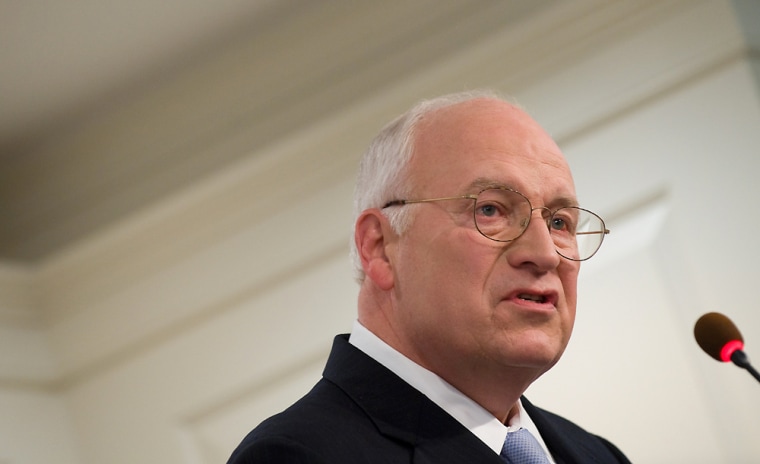Dick Cheney refuses to be a has-been.
The former vice president's voice appears to carry even more weight than it did in the waning days of the Bush administration.
Some people want him to be quiet and disappear. Others are cheering the public relations tour that Cheney began halfway through President Barack Obama's first 100 days, defending the Bush administration's harsh interrogation tactics and other anti-terrorism policies.
Vice presidents typically fade away quietly.
Not Cheney.
When Obama released memos detailing Bush-era interrogation techniques and would not completely rule out prosecuting or disciplining former Bush administration officials, Cheney could not stay silent.
"It wasn't like on Jan. 21, he planned that he was going to speak out in this way," said Cheney's daughter, Liz, a former State Department official who has traveled extensively with her father. "It was driven by events and I think he will continue to do it if he feels it's important to the public debate."
"You just have to know the way he works," she said. "He was watching what was going on. He knew it was wrong and he knew he had an obligation to say it was wrong."
Cheney’s impact
The Cheney camp says it's not about politics.
In Washington, however, everything is about politics, and Cheney's decision to make his case on talk shows and deliver speeches at think tanks cuts both ways. His message fires up conservatives, but also rallies Democratic opponents who do not miss an opportunity to portray the unpopular Cheney as the lead spokesman of the Republican Party.
"I would think the Republicans ought to be shy in using him as their front," said Sen. Carl Levin of Michigan, chairman of the Senate Armed Services Committee. He dismisses Cheney's appearances as if they were old TV reruns.
Even some prominent Republicans are not too happy about Cheney's message.
Former Pennsylvania Gov. Tom Ridge, the first U.S. homeland security chief, was asked if he agreed with Cheney's assertion that the Obama administration has made the country less safe. "I do not," Ridge said.
Cheney supporters say the former vice president has received an outpouring of supportive e-mails, calls and comments from the military community, the families of those who died in the attacks of Sept. 11, 2001, and from people at the CIA, which helped carry out the interrogation program.
His backers claim Cheney is having an impact. They point to Obama's move to reverse himself and fight the court-ordered release of prisoner abuse photos and his decision to revive military tribunals for some suspected terrorists, although the president is revamping how that system would work.
They also cite the Democratic-controlled Senate's vote to deny Obama $80 million to close the Guantanamo prison in eight months, as the president promised.
"It's nothing personal. It's nothing political. It's not legacy," said former Cheney counselor Mary Matalin, who has known Cheney for three decades. "There's one and only one thing that's animating and motivating his advocacy and that's Obama's behavior relative to these security policies — the release of the legal memos and the open-endedness of the potential prosecution of the intelligence gatherers or the lawyers."
Matalin said Cheney would not stop talking even if leaders of the Republican Party asked him to.
Defending Bush administration policies
Cheney, 68, has squeezed public defense of Bush policies into his private life, which he splits between his suburban Washington home in McLean, Va., and his homes in Wyoming and on Maryland's Eastern Shore.
He still has Secret Service protection but drives himself whenever possible. He spends time working on his memoirs and at his transition office in McLean. Every few weeks he hosts lunch for guests around his kitchen table to discuss foreign policy and national security issues. He is with his grandchildren at softball games and Sunday dinners.
Cheney has always been straightforward. But when he walked in Bush's shadow he had to temper his public remarks, stay on the White House message. He could manipulate the levers of powers behind the scenes, which conjured up the image of "Star Wars" villain Darth Vader.
Out of office, he has turned to the podium, television news shows and interviews to insert himself in the public debate — and not only on national security.
In his first television interview after leaving office, just 54 days after Obama was sworn in, Cheney said that it's not fair to blame the economic woes on the Bush administration. Cheney said it was a global financial problem that he feared the new administration could use to justify a massive expansion in the government and meddling in the private sector.
"I don't know if this is some sort of psychological liberation," said Joel Goldstein, a law professor at Saint Louis University who has written extensively on the vice presidency. "Now he can come out of the undisclosed locations. He's his own man again. He's free from those restraints that are inherent in being vice president — even if you are the most powerful vice president in history."
It's deja vu for Cheney, who once was on the other end of a former vice president unplugged.
In September 2004, Al Gore, the cautious campaigner, transformed into a Bush basher, faulting Cheney for "sleazy and despicable" criticism of the Democrats. A Bush White House spokesman dismissively responded: "Consider the source."
The tables have turned. At the White House on Friday, Obama spokesman Robert Gibbs said it appears that Cheney's latest speech was an extension of the same argument that occurred "inside these walls" for many years during the administration in which he served for eight years.
